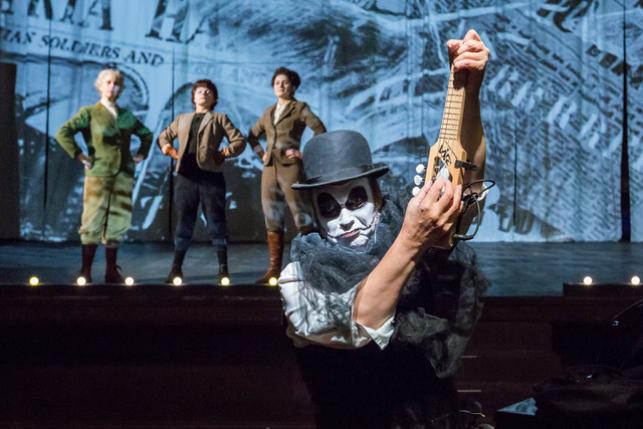Itself scarred by the trials of war, Leith Theatre is the perfect location to stage this endurance of war-time docudrama. Bringing together an international cast of talented performers, The Last Days of Mankind illustrates how far as a culture we have come, yet still must go. Delivering one of Karl Kraus’ most important works, the show is a collaborative piece of documented wartime life, with expressionist scenes to heighten the commentary.
Across the capital, a variety of centennial events marking the armistice are occurring. The Last Days of Mankind provide an occasion like no other. Whilst it is by no means better or worse, the way they deliver its message sets them apart. A theatrical cabaret styling of newspaper clippings, true events and expressionist physical performance convey the writhing of burned victims of war.
Though all have worked tirelessly to bring this back to the stage, it cannot be helped but realise that the focus is on The Tiger Lillies. Nevertheless, The Tiger Lillies’ performance – Martyn Jacques’ narration, in particular – is just sublime. It’s warped and unnerving at times, yet delivers a jovially dark, tinted humour that can’t help being soaked up. Composing a series of songs for the production, they expertly set the mood, furthering the onstage suffering through choice titles such as Die For Your Country, Infant Mortality and the marvellously performed Syphilitic Slut. Unfortunately, clarity plays an issue in some moments, and in such a text rich production as this, clarity is key.
We never learn from history, do we? For all his bias towards media, Kraus’ text has merit, even to those who work within the industry. Those who control the press, control the people. They achieve this through encouraging nationalism and winning the favour of the elite – all this, however, comes at the cost of our future and well-being. The play’s central issue turns the spotlight onto modernity, with the claws of media straggling the truth – picking what they feel like dishing out, while starving us of the rest. The people cannot survive on words, no matter how much we attempt to cram into their mouths.
For as moving as The Last Days of Mankind can be – raw and gripping to the atrocity of war – no art form will capture the horror experienced by those people. In spite of this limitation, the cast work hard to lay bare the atrocities of the war in front of their audience. One scene in which cast members disrobe in order to be bandaged, choked and paraded, act as one of many grotesque reminders.
Advertised as dark, the humour is never beyond the scope, nor is it disrespectful. We have to remember that attitudes conducted onstage were all beliefs that exist – and persist today. As The Last Days of Mankind proves, you don’t have to make people cry in order to move them; you can make them laugh instead. For as the audience laugh, they are left exposed to the hard truths you are about to hit home.
Karl Kraus was certainly not jesting when commenting that the dramatisation of his piece would “stretch out over ten days”. Regrettably, some audience members could not handle the intense length, perhaps coupled with the play’s complex concepts. In the end, this was their loss.
This production at Leith Theatre, supported by Creative Scotland and Creative Europe, reminds us of how stringent our connections are. In an environment where, in an instant, we are told several different versions of events. Where one person’s tweet could spark an international crisis. In a world where issues of the past still haunt our day-to-day lives, it’s no wonder that works such as The Last Days of Mankind should rear their faces once more. This is something special, and one everyone involved should be proud of.
